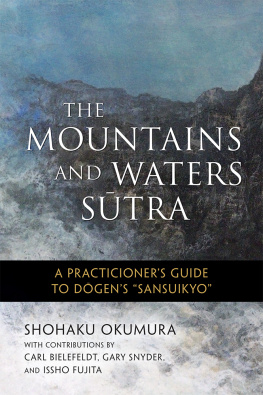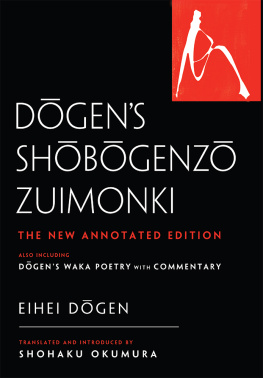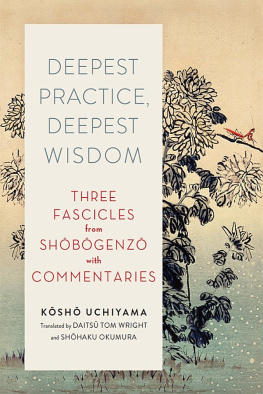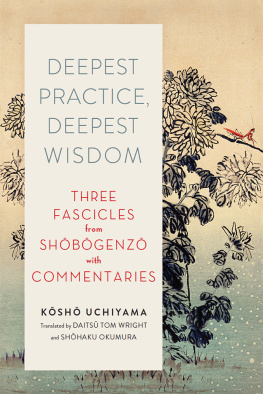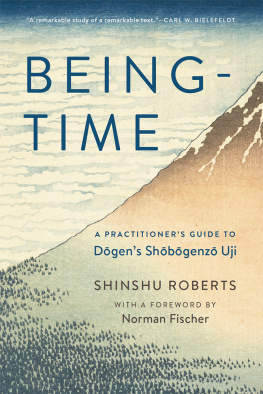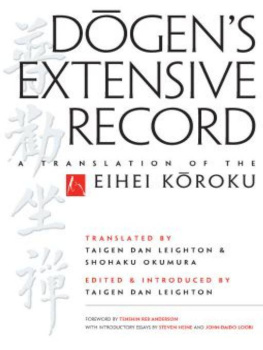
AN INDISPENSABLE COMPANION TO A BELOVED ZEN TEXT
Mountains and waters are the expression of old buddhas.
So begins Sansuiky, or the Mountains and Waters Stra, a masterpiece of poetry and insight from Eihei Dgen, the thirteenth-century founder of the St school of Zen.
Shohaku Okumura renowned for his translations of and magisterial teachings on Dgen guides the reader through the rich layers of metaphor and meaning in Sansuiky, which is often thought to be the most beautiful essay in Dgens monumental Shbgenz . His wise and friendly voice shows us the questions Dgen poses and helps us realize what the answers could be. What does it mean for mountains to walk? How are mountains an expression of Buddhas truth, and how can we learn to hear the deep teachings of river waters? Throughout this luminous volume, we learn how we can live in harmony with nature in respect and gratitude and awaken to our true nature.
Okumura has been contemplating, studying, and teaching Dgen for many decades, which is evident in the remarkable insight he brings and the clarity with which he presents it.
Buddhadharma: The Practitioners Quarterly
Shohaku Okumura is a St Zen priest and Dharma successor of Ksh Uchiyama Rshi. Hes the cotranslator, along with Taigen Dan Leighton, of Dgens Extensive Record and the translator and author of many books on Zen and Dgen. He is the founding teacher of the Sanshin Zen Community, based in Bloomington, Indiana.
C ONTENTS
F OREWORD
I HAVE KNOWN Rev. Shohaku Okumura for more than thirty years. I met him for the first time when I visited Antaiji temple in Hygo Prefecture, Japan, at the age of twenty-seven, to check out whether it would be good for me to stay as a resident practitioner.
I had practiced Rinzai-style Zen in Tky for a year as a lay practitioner, and Id decided to drop out of graduate school to become a full-time training monk. A Rinzai Zen master ( rshi ) with whom I had been studying strongly recommended Antaiji. He said, Mr. Fujita, youre not interested in becoming a priest to manage a temple, right? If you want to live a life purely based on zazen, nothing to do with qualifying as a priest, maybe Antaiji is more suitable for you than a traditional monastery.
Thus, in the winter of 1982 I came up to Antaiji. The temple was completely isolated from the outer world and covered with heavy snow, almost nine feet high. I had to walk up from the foot of the mountain with snowshoes. About twenty people, monks and lay people, were living up the mountain, together with some dogs. During this visit I stayed at Antaiji for twenty days. My original plan had been to stay one week. I extended it because I wanted to experience more Antaiji-style sesshin (a period of intensive meditation practice) and to see more of their everyday life there. I liked the atmosphere of Antaiji.
While I was staying, I attended special lectures on Zen that were given for six Italian people, three monks and three laywomen. A tall and handsome Japanese monk taught the history and teachings of Zen in English. I had never heard Zen being explained in English. I became very intrigued by this monk. That was Rev. Shohaku Okumura. Since then I have always called him Shohaku-san, with great respect and affection.
Three months after this visit I started living at Antaiji as a resident and got ordained the following year. At that time I could not have imagined that a few years later, in 1987, I would go to the United States and live at the place Shohaku-san cofounded in the early 1970s: Pioneer Valley Zend in Massachusetts. I lived there as a resident priest for more than seventeen years.
In 2010, five years after I came back from the United States to Japan, I was assigned to be the director of the St Zen Buddhism International Center in San Francisco. Shohaku-san had been the first director for twelve years. Somehow it seems that I have always been following in his footsteps first Antaiji, then Pioneer Valley Zend, and finally the International Center. And now I was asked by him to write a preface to his wonderful commentary to Dgen Zenjis Shbgenz Sansuiky. I do it with heartfelt gratitude. I also feel humbly honored.
Shohaku-san is a kind of very rare and precious spiritual resource for English-speaking people who are interested in Dgens Zen. It is not so easy to find a Japanese Zen teacher who can lead a Genz-e (an intensive retreat to study Shbgenz ) without relying on a translator. He has rich and deep experience of practicing and studying Zen in both Japan and America. This background enables him to be a strong and effective bridge between two different cultures.
Even for Japanese people, Dgen Zenjis Shbgenz is one of the most challenging books to read, because he uses the language acrobatically to point to what cannot be described by language. It is like learning a completely new language with its own distinct grammar and vocabulary even though it looks like Japanese. I call it Dgenese. Sometimes I even wonder if it is possible to translate it into a non-Japanese language at all. That is why I very much admire the sincere effort of many people who work hard to translate Dgen Zenjis writing into English.
I think the best way to get access to Shbgenz is to keep reading aloud the original Japanese many times, whether you understand it or not, until some understanding of Dgenese spontaneously emerges from it. But that approach is limited to only those who understand Japanese. The second-best way, I think, is to read a detailed and in-depth commentary with the good translation of Shbgenz . Shohaku-san has been providing such commentaries on Genjkan and other fascicles of Shbgenz for years. Now you have such a great gift from him in your hands. Congratulations!
Sansuiky is a completely unique fascicle in the sense that Dgen Zenji picks up concrete things like mountains and waters as a theme, rather than abstract concepts such as being, time, mind, good and evil, buddha nature, and so forth, as he does in other fascicles. Mountains and waters are physical, not metaphysical at all, but he eloquently expounds them as Buddhadharma.
Delving into Sansuiky, we can encounter the mountains and waters with a freshness of the heart that is beyond the human-centered mind. That is the world of mountains are mountains, waters are waters, as the old buddha in the text says, unfolded through practicing zazen. Through zazen, we can eventually realize with our own bodies what is written in Sansuiky.
I am confident that with this book you will get some insight into the depth of Dgen Zenjis articulations of the Dharma and be inspired toward practicing zazen.
Issho Fujita
Director, St Zen Buddhism
International Center, San Francisco, CA
E DITORS P REFACE
O N FIRST HEARING the title Mountains and Waters Stra, I found my heart opening. The truth is written in the mountains, the rivers, and the whole earth: this is what I have known all my life. Yet on attempting to read it, I became quite confused. Blue mountains walk? Dgens poetic writing did not yield to me. Only by working with this commentary did I begin to enter the profound and intimate teaching Dgen offers; through mountains and waters he discusses everything in the teaching and in our whole life of practice.
With no interest in summarizing, I offer a few of my favorite quotations from Sansuiky:
We must bring to realization the road on which the self encounters the self.These words should be engraved on skin, flesh, bones, and marrow, engraved on the interior and exterior of body and mind, engraved on emptiness and on form; they are engraved on trees and rocks, engraved on fields and villages.Although we say that mountains belong to the country, actually they belong to those who love them.
Next page
